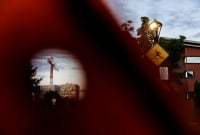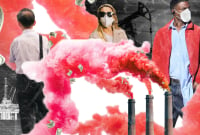Thank you for helping us meet our fundraising goal!
The provincial government's management of Alberta's increasingly stressed water resources is all wet, says the province's auditor general.
A highly critical report from the auditor released Wednesday finds Alberta has implemented water conservation objectives in two of its seven major river basins. The government also doesn't know if existing water conservation objectives are working.
The report says processes to monitor water use, assess risks and decide when conservation is needed are weak. And monitoring to ensure water users are being efficient and staying within the requirements of their licences aren't up to the job.
"(Alberta Environment and Protected Areas) lacks effective processes to manage surface water allocations and use," said auditor general Doug Wylie. "Public reporting on the outcomes of surface water management is lacking."
Environment Minister Rebecca Schulz was not available to answer questions.
In an emailed statement, department spokesman Ryan Fournier said it takes Wylie's conclusions seriously and is spending $18.5 million over three years on a review of the province’s water management and regulatory system.
Wylie's report says the lack of conservation objectives covers both water quality and quantity concerns.
"(It includes) impacts on aquatic life, impacts that various industrial, commercial and recreational activities would have," said assistant auditor general Eric Leonty, who oversaw the audit.
There are no triggers that let managers know when water is running short. Little monitoring and enforcement is done to ensure current users are following their licences.
"What we found for the majority of those compliance assessments is that they weren't completed," said Leonty. "A number of staff didn't even know that was a requirement."
In many cases, Leonty said water licences were renewed even when there was evidence the rules weren't being followed.
As well, the report says Alberta's water management system is based on information that is years old.
"When it comes to something like the overall supply and demand levels, the last time that was (studied) was about 16 years ago," Leonty said.
The report also concludes that Alberta is ill-equipped to react to changing water conditions. The province's first-in-time, first-in-right system of management locks in historic use patterns and ensures licence holders get water whether they use it all or not.
"Historic water licences aren't impacted by a water conservation objective," said Leonty. "That does result in constraints, even when there is a conservation objective, to deal with that situation.
"The current approach is reactive rather than proactive."
Fournier said the upcoming review will work with water users to improve conservation and productivity. And it will modernize information management systems to allow managers to react more quickly.
"Water conservation objectives are already in place where they are most effective, in areas with high water demand or where water shortages are more common," he said.
Wylie added that public reporting should also improve.
While data from individual licences is available, information on basins and sub-basins is not. As well, the report says the government relies on self-reporting, which it describes as "clearly ineffective."
Kennedy Halvorson, water specialist with the Alberta Wilderness Association, said the audit reflects concerns her group has had for years.
"The government is essentially making decisions without knowledge or regard for the minimum amount of water required to keep our watersheds viable," she said. "They're doing that without keeping records or sufficient regard to the public."
The audit comes as Alberta continues to experience water worries.
Most of the province is considered either abnormally dry or under drought conditions from moderate to extreme. As of July 4, there were 23 water shortage advisories in the province.
Municipalities, irrigators and industry in southern Alberta have agreed to reduce their water use, although the agreements are not binding.
Climate scientists say the Prairies will experience lower summer stream flows, falling lake levels, retreating Rocky Mountain glaciers and drought.
Meanwhile, the province's energy regulator is reviewing proposals for coal mining exploration, a thirsty industry.
"(Water) is life," said Halvorson. "It's precious.
"We need to know we're using it in a way that's supportable long term."
This report by The Canadian Press was first published July 10, 2024.






Comments
Knowing how this government works, they won't attempt anything realistic until we actually run out of water.
The flows in the Oldman, Red Deer and Bow show sufficient water, yet the distribution is in trouble.
With our obligation to let 50% go to Saskatchewan what will happen.
A failure in a syphon on the USA Milk River is threatening a dry river and water to Town of Milk River
My apologies for replying to the Green Party article instead of this one on the dangerous, casual and consistent incompetence of this "government" at the absolute worst possible time, but the two articles are not unrelated.
Alberta is on target to lead the country in a NEW, horrible way, as the how-to for systemic/civilizational collapse.
And we heard on the news last night that the lovely "Hell's Angels" have chosen Lethbridge to start a new "chapter" in. The ever earnest "Downtown Revitalization Group" may as well throw in the towel since not only do we already have an alarming number of homeless, lost souls regularly lurching onto the streets downtown, now we'll have to worry about them being run over by the influx of motorcycles.....
+
We're so clever on the left. Not content with having just one party to split the progressive vote, we cheerfully encourage TWO, EVEN with the reality of climate change that, if not THE "game-changer" of all time, then what in hell ever COULD be?
And this insanity is all very seriously and earnestly evaluated by a political "science" professor?
CLEARLY the game is ALL, and as a species, we are truly too dumb to live.
And then there's the further humiliation---that the cons have long ago grasped this reality, and are winning power at the worst possible time, everywhere in the world, right in front of us, while we fret and fuss away in the weeds as if the massive, warming, flagging world was still just our little oyster. As if it wasn't down to THIS or THAT, period.
There's just no helping people.
The Alberta government is making crucial decisions based dated information, insufficient information, flawed information--and absent information.
(Gasp)
Say not so! HOW could this be?
Really truly, all snarks & fury aside, why are Alberta voters so determined to elect governments with no brains, and no ethics?
I live in Ontario, so, same-same here. Our Thug at the Helm got in the first time because people voted out a Premier who was knowledgeable, educated, experienced, articulate, intelligent, and brought in our very own dip-spit, who had clearly demonstrated his lack of all those qualities, and whose only platform plank was "buck a beer". He's been vandalizing the province ever since--the list of crimes against the province and its citizens gets longer every day.
And we have no recourse.
In Ontario, I've been pushing for years for true accountability legislation: you screw something up, there are swift and appropriate consequences for that action---just like in the real world.
I would also like to see mandatory voting, and fundamental competency testing of voters: what do you know about the person/party you're planning to vote for, and his/her positions & plans, what are the information sources for that information, and how did you decide.
We make the most important citizen decisions based on less and less, and falser and falser, information.